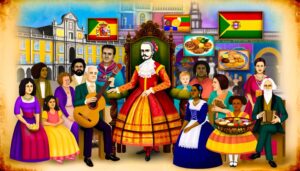Charlotte Name Meaning and Origin
Charlotte originates from the Old German name 'Karl,' meaning 'free man.' It evolved through French influence, eventually becoming a feminine form in the 18th century. The name gained historical significance from Queen Charlotte of Mecklenburg-Strelitz, cementing its status in European aristocracy.
Literary figures like Charlotte Brontë and royal associations, including Princess Charlotte of Cambridge, have further enriched its cultural legacy. With a resurgence in the early 20th century, Charlotte continues to be embraced globally.
Variations like Charlot and Carlotta, and diminutives such as Lottie and Charlie, reflect its adaptability. Exploring further reveals its multifaceted historical journey.

Key Takeaways
- Charlotte originates from the Old German name 'Karl,' meaning 'free man.'
- The name gained popularity in France as a feminine form of 'Charles' in the 18th century.
- Queen Charlotte of Mecklenburg-Strelitz enhanced its acceptance in European aristocracy.
- Charlotte Brontë and characters in literature highlight the name's cultural impact.
- Modern resurgence is influenced by Princess Charlotte of Cambridge's royal endorsement.
Historical Background
Tracing back to its origins, the name Charlotte finds its roots in the Old German name 'Karl,' which means 'free man' and has evolved over centuries through various cultural and linguistic transformations.
Initially popularized in France as 'Charles,' the feminine form 'Charlotte' gained prominence in the 18th century. The name's widespread acceptance was notably influenced by Queen Charlotte of Mecklenburg-Strelitz, wife of King George III of England. Her patronage of the arts and sciences, combined with her social stature, cemented the name in European aristocracy.
Subsequently, the name crossed the Atlantic, becoming a favored choice in America. This historical journey reflects not only the name's linguistic evolution but also its enduring appeal across different cultures and eras.
Etymology
The etymology of the name Charlotte can be traced back to its French historical roots, originating as the feminine diminutive of 'Charles.' In French, the name Charlotte has been popular since the 17th century, and it eventually spread to English-speaking countries. The name has a rich history and has been borne by many prominent figures throughout the centuries. For those interested in names and their meanings, it can be fascinating to discover the origin of Petra, another popular feminine name.
Over centuries, the name has undergone significant linguistic evolution, adapting to various cultural contexts while retaining its noble connotations.
Its regal associations are further cemented by its frequent appearance in royal lineages and literary works, underscoring its enduring appeal and prestige.
French Historical Roots
Historically rooted in French culture, the name Charlotte derives from the male name Charles, which means 'free man' in Germanic languages. The name Charlotte traces its prominence back to the French nobility and royalty. It gained significant popularity in the 17th and 18th centuries, particularly within the French court.
Various historical figures, such as Queen Charlotte of Mecklenburg-Strelitz, wife of King George III of England, further solidified its regal connotations. The feminine form, Charlotte, was embraced for its elegance and grace, embodying the virtues of nobility. This historical association with the aristocracy and its use among European royalty underscore the name's enduring heritage and its esteemed status throughout French history.
Name's Linguistic Evolution
Building upon its noble French origins, the name Charlotte has undergone a fascinating linguistic journey, evolving through various languages and cultures to maintain its timeless appeal.
Derived from the French diminutive of 'Charles,' meaning 'free man' or 'warrior,' Charlotte first gained prominence in medieval France. Its etymological roots trace back to the Old Germanic name 'Karl,' illustrating the deep historical connections.
As the name traversed borders, it was embraced by English-speaking nations during the 17th century, largely due to royal influences.
Today, Charlotte retains its classic charm, resonating in numerous languages, including Spanish (Carlota), Italian (Carletta), and Scandinavian variants. This linguistic evolution underscores the name's enduring versatility and widespread cultural significance.
Royal and Literary Connections
Inextricably linked to its aristocratic and cultural heritage, the name Charlotte has been immortalized through its association with royalty and its prominent appearances in literary works. The name has graced European courts, notably with Queen Charlotte, wife of King George III of England, and Princess Charlotte of Cambridge, daughter of Prince William. Literary giants have also embraced the name, such as in the Brontë sisters' novels. It appears in works by Jane Austen and in the classic "Charlotte's Web" by E.B. White.
| Royal Figure | Country | Era |
|---|---|---|
| Queen Charlotte | United Kingdom | 18th century |
| Princess Charlotte of Cambridge | United Kingdom | 21st century |
| Charlotte Brontë | United Kingdom | 19th century |
| Charlotte of Belgium | Belgium | 19th century |
| Princess Charlotte of Monaco | Monaco | 21st century |
French Influence
The name Charlotte, deeply rooted in French culture, reflects the country's rich historical and linguistic heritage. Derived from the male name Charles, Charlotte is the feminine diminutive, signifying 'free man' or 'petite'.
Its popularity soared in France during the 17th century, particularly among nobility and royalty. The name encapsulates the elegance of French phonetics with its soft, melodic cadence. It carries historical weight, having been borne by notable figures such as Queen Charlotte of Mecklenburg-Strelitz, wife of King George III of England, who had significant French Huguenot ancestry.
The adoption of the name Charlotte in various European royal houses underscores its enduring appeal and the influence of French culture on European naming conventions.
Literary Significance
Charlotte's literary significance can be traced through a myriad of classical and contemporary works, where the name often evokes themes of nobility, elegance, and historical depth.
In literature, Charlotte Brontë, author of the seminal novel 'Jane Eyre,' stands as a paragon of the name's enduring legacy. Her works reflect the Victorian era's complex social mores and underscore the name's association with strong, intellectual women.
Additionally, the character Charlotte Lucas in Jane Austen's 'Pride and Prejudice' embodies pragmatic wisdom and resilience.
More contemporary references include E.B. White's 'Charlotte's Web,' where the titular spider Charlotte epitomizes kindness and ingenuity. These literary instances collectively enhance the name's timeless appeal and underscore its rich narrative heritage.
Royal Connections
The name Charlotte has long been intertwined with royalty, tracing back to notable historical figures such as Queen Charlotte of Mecklenburg-Strelitz, the wife of King George III of England.
In contemporary times, the name continues to hold regal significance, exemplified by the naming of Princess Charlotte of Cambridge, the daughter of Prince William and Catherine, Duchess of Cambridge.
This enduring association with royal lineages across various nations underscores the name's widespread influence and esteemed standing within global aristocracy.
Historical Royal Figures
Among historical royal figures, Princess Charlotte of Wales stands as a notable bearer of the name, whose untimely death in 1817 profoundly impacted the British monarchy and succession. Charlotte's demise at age 21 terminated the direct line of succession, leading to a scramble among royal family members to produce an heir. This event indirectly led to the birth of Queen Victoria, who would later shape British history. Charlotte's legacy reflects the fragility of dynastic continuity and the critical role she played, albeit posthumously, in altering the course of the monarchy.
| Figure | Significance |
|---|---|
| Princess Charlotte | Disrupted succession |
| Queen Victoria | Indirect heir |
| British Monarchy | Impact on continuity |
Modern Royal Usage
In contemporary royal circles, the name Charlotte has seen a resurgence in popularity, exemplified by the naming of Princess Charlotte of Cambridge, born in 2015 to Prince William and Catherine, Duchess of Cambridge. This choice not only honors her paternal grandmother, Princess Diana, whose middle name was also Charlotte, but it also reflects a historical lineage.
Charlotte has been a name borne by European royalty for centuries, including Queen Charlotte of Mecklenburg-Strelitz, consort to King George III. The modern adoption of the name underscores a blend of tradition and contemporary appeal, suggesting a continuity of regal heritage while appealing to modern sensibilities. The name's royal usage today reinforces its timeless elegance and enduring significance within the monarchy.
Global Royal Influence
Across various monarchies worldwide, the name Charlotte has consistently demonstrated its prominence and esteemed status, reflecting deep-rooted connections and influences within royal families. Historically, the name Charlotte has adorned numerous queens and princesses, exemplifying its regal significance.
For instance:
- Queen Charlotte of Mecklenburg-Strelitz: Consort to King George III of Britain.
- Princess Charlotte of Wales: Daughter of King George IV, whose untimely death influenced British succession.
- Charlotte of Belgium: Empress of Mexico, wife of Emperor Maximilian I.
- Princess Charlotte of Cambridge: Current British royal and daughter of Prince William and Catherine, Duchess of Cambridge.
These illustrious figures illustrate how the name Charlotte has been interwoven with royal heritage, underlining its enduring legacy across different epochs and domains.
Popularity Over Time
Although the name Charlotte has historical roots extending back several centuries, its popularity has experienced significant fluctuations over time. Initially prominent in the 18th century, partly due to Queen Charlotte, wife of King George III, the name saw a decline in the 19th century.
However, Charlotte began to regain favor in the early 20th century, peaking during the 1920s. A subsequent decline followed, but a resurgence occurred in the 21st century. This resurgence can be attributed to various cultural and societal influences, including literary references and notable public figures.
Detailed historical records and birth registries indicate that Charlotte has consistently remained a classic choice, demonstrating its enduring appeal and adaptability across different eras and contexts.
Modern Usage
The name Charlotte has seen a remarkable resurgence in contemporary times, bolstered by its frequent appearance in popular media and the influence of high-profile personalities. This classic name has become synonymous with elegance and timeless appeal, capturing the admiration of modern parents.
Key factors contributing to its renewed popularity include:
- Royal Endorsement: The naming of Princess Charlotte of Cambridge has notably boosted its prominence.
- Television and Film: Characters named Charlotte in popular TV series and movies have reinforced its appeal.
- Literary Presence: Classic literature featuring characters named Charlotte continues to inspire.
- Cultural Integration: Diverse communities have embraced the name, reflecting its universal charm.
These elements collectively underscore Charlotte's enduring allure in the 21st century, making it a favored choice for new generations.
Variations and Nicknames
Charlotte, with its rich historical roots and widespread cultural significance, has naturally developed a variety of intriguing variations and affectionate nicknames over the centuries.
The name's French origins have given rise to forms such as 'Charlot' and 'Carlotta' in Italian and Spanish contexts.
In English-speaking regions, diminutives like 'Lottie' and 'Charlie' offer endearing alternatives.
The German variant 'Liselotte' combines elements of both Charlotte and Elisabeth, reflecting cross-cultural influences.
Each variation and nickname encapsulates unique phonetic and cultural nuances, illustrating the name's adaptability across different societies.
These derivatives highlight the enduring popularity and versatility of Charlotte, revealing how a single name can traverse linguistic and cultural boundaries while maintaining its core essence.
Cultural Impact
Rooted in a rich historical tapestry, the name Charlotte has left an indelible mark on literature, politics, and popular culture, symbolizing elegance and resilience across generations. Its cultural significance is deeply embedded in various domains:
- Literature: Charlotte Brontë, the esteemed 19th-century novelist, whose works like 'Jane Eyre' have become timeless classics.
- Royalty: Princess Charlotte of Cambridge, a contemporary figure who continues the name's royal legacy.
- Television: Charlotte York from 'Sex and the City,' embodying sophistication and traditional values in modern media.
- Music: Charlotte Church, a prodigious singer whose career began in childhood, showcasing the name's association with talent and grace.
These references highlight the name's enduring appeal and its multifaceted cultural resonance.
Conclusion
The name Charlotte, like a timeless tapestry, weaves together rich historical threads, etymological roots, and royal connections. From its French origins to its literary significance, the name has flourished across centuries, reflecting cultural shifts and societal values.
Its enduring popularity and varied modern usage illustrate its adaptability and universal appeal. The myriad of variations and nicknames further cements Charlotte's place in linguistic and cultural history, resonating deeply within the collective consciousness.






